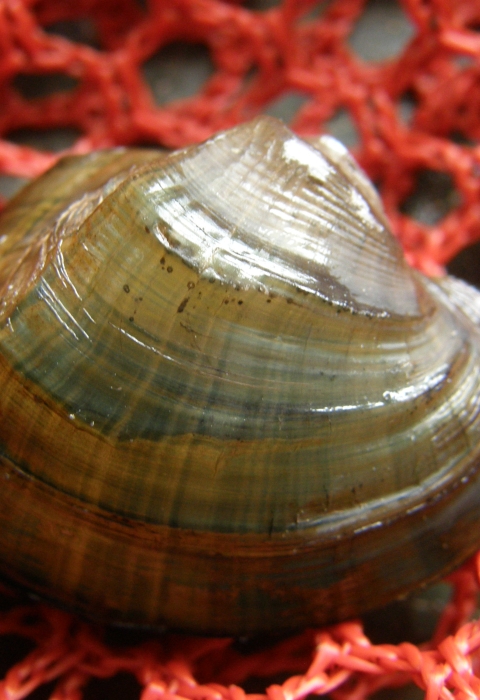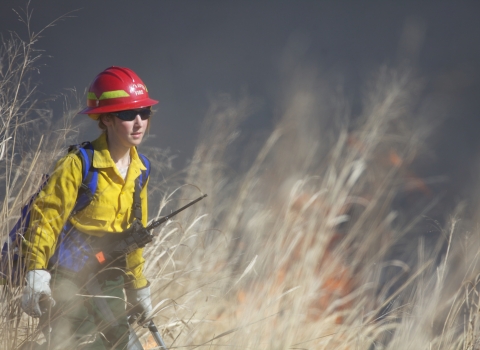Date: 6/20/2023
Contact: Denise Rowell, denise_rowell@fws.gov, 251-656-3490
An extremely rare freshwater mussel located in one of the Southeast’s most biologically diverse aquatic ecosystems is on the brink of extinction.
The southern elktoe, historically found within the Apalachicola, Chattahoochee and Flint River (ACF) Basin in Alabama, Georgia, and Florida, has disappeared from most of its range. The U.S. Fish and Wildlife Service is proposing to list the mussel as endangered under the Endangered Species Act and to designate critical habitat in rivers and streams that will contribute to the conservation of the species.
The southern elktoe is a medium-sized freshwater mussel that needs clean, flowing creeks and rivers to thrive. Poor water quality and decreased water quantity associated with agricultural and urban land uses have affected populations of the southern elktoe. Barriers found within the ACF, such as dams, have also hindered movement of host fish needed for the southern elktoe to reproduce.
The ACF Basin provides habitat for more than 100 aquatic species; millions of people also depend on the ACF for drinking water, power generation, and recreation.
“Mussels such as the southern elktoe serve as ecological indicators of the health of river basins, including the ACF. It’s clear the population of this mussel is disappearing, so we must be diligent in maintaining high water quality within this biologically diverse watershed,” said Acting Southeast Regional Director Mike Oetker. “By protecting the southern elktoe and its habitat, we are not only committed to recovering this species, we are also ensuring favorable water quality for people who depend on it for human use.”
As we recognize the 50th Anniversary of the Endangered Species Act, it’s important to note that species such as the southern elktoe are a part of the web of life, each with a unique cultural and biological community, performing services that are essential to our combined well-being. By conserving them, we help ensure the benefits that accrue from them—healthy air, land, and water—on which we depend.
The Service is also proposing to designate five units of critical habitat for the recovery of the southern elktoe, totaling approximately 577.6 river miles. Those units are found in the Apalachicola River, Chipola River, Lower Flint River Complex, Upper Flint River Complex, and Middle Chattahoochee River.
Seventy-nine percent of the proposed critical habitat for the southern elktoe overlaps with existing critical habitat for listed species, including the Gulf sturgeon and Gulf moccasinshell. State protections also occur in the Apalachicola, Chipola and Ichawaynochaway populations. For more information on the proposal to list the southern elktoe as endangered, and designate critical habitat, please read our Frequently Asked Questions.
The proposed rule to list the southern elktoe as endangered and designate critical habitat appears in the Tuesday, June 20, 2023, Federal Register. Comments on the proposal may be submitted through August 21, 2023 by one the following methods:
Electronically: Go to the Federal eRulemaking Portal: regulations.gov. In the Search box, enter FWS-R4-ES-2022-0179, then click “Search”. On the resulting page, in the panel on the left side of the screen under the Document Type heading, check the Proposed Rule box to locate this document. You may submit a comment by clicking on “Comment.”
By hard copy: Submit by U.S. mail to: Public Comments Processing, Attn: FWS-R4-ES-2022-0179, U.S. Fish and Wildlife Service, MS: PRB/3W, 5275 Leesburg Pike, Falls Church, VA 22041–3803.
We request that you send comments only by the methods described above. We will post all comments on regulations.gov. This generally means that we will post any personal information you provide.
The mission of the U.S. Fish and Wildlife Service is working with others to conserve, protect, and enhance fish, wildlife, plants, and their habitats for the continuing benefit of the American people. For more information on our work and the people who make it happen, visit www.fws.gov. Connect with our Facebook page at www.facebook.com/usfwssoutheast, follow our tweets at www.twitter.com/usfwssoutheast, watch our YouTube Channel at http://www.youtube.com/usfws and download photos from our Flickr page at http://www.flickr.com/photos/usfwssoutheast.



